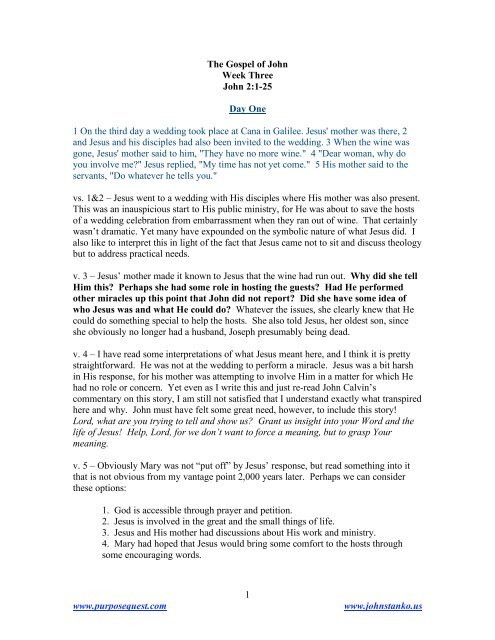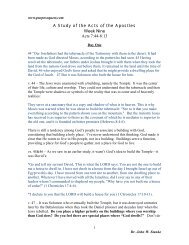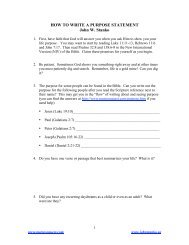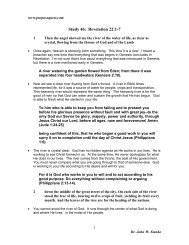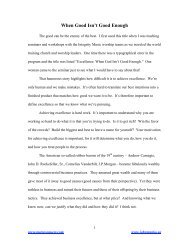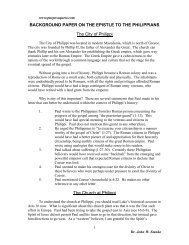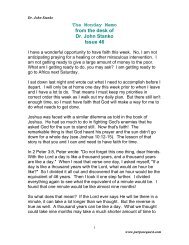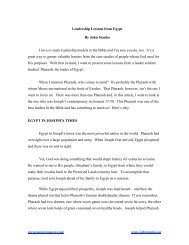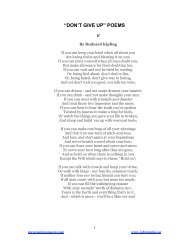Create successful ePaper yourself
Turn your PDF publications into a flip-book with our unique Google optimized e-Paper software.
The Gospel of <strong>John</strong>Week Three<strong>John</strong> 2:1-<strong>25</strong>Day One1 On the third day a wedding took place at Cana in Galilee. Jesus' mother was there, 2and Jesus and his disciples had also been invited to the wedding. 3 When the wine wasgone, Jesus' mother said to him, "They have no more wine." 4 "Dear woman, why doyou involve me?" Jesus replied, "My time has not yet come." 5 His mother said to theservants, "Do whatever he tells you."vs. 1&2 – Jesus went to a wedding with His disciples where His mother was also present.This was an inauspicious start to His public ministry, for He was about to save the hostsof a wedding celebration from embarrassment when they ran out of wine. That certainlywasn’t dramatic. Yet many have expounded on the symbolic nature of what Jesus did. Ialso like to interpret this in light of the fact that Jesus came not to sit and discuss theologybut to address practical needs.v. 3 – Jesus’ mother made it known to Jesus that the wine had run out. Why did she tellHim this? Perhaps she had some role in hosting the guests? Had He performedother miracles up this point that <strong>John</strong> did not report? Did she have some idea ofwho Jesus was and what He could do? Whatever the issues, she clearly knew that Hecould do something special to help the hosts. She also told Jesus, her oldest son, sinceshe obviously no longer had a husband, Joseph presumably being dead.v. 4 – I have read some interpretations of what Jesus meant here, and I think it is prettystraightforward. He was not at the wedding to perform a miracle. Jesus was a bit harshin His response, for his mother was attempting to involve Him in a matter for which Hehad no role or concern. Yet even as I write this and just re-read <strong>John</strong> Calvin’scommentary on this story, I am still not satisfied that I understand exactly what transpiredhere and why. <strong>John</strong> must have felt some great need, however, to include this story!Lord, what are you trying to tell and show us? Grant us insight into your Word and thelife of Jesus! Help, Lord, for we don’t want to force a meaning, but to grasp Yourmeaning.v. 5 – Obviously Mary was not “put off” by Jesus’ response, but read something into itthat is not obvious from my vantage point 2,000 years later. Perhaps we can considerthese options:1. God is accessible through prayer and petition.2. Jesus is involved in the great and the small things of life.3. Jesus and His mother had discussions about His work and ministry.4. Mary had hoped that Jesus would bring some comfort to the hosts throughsome encouraging words.www.purposequest.com1www.johnstanko.us
5. Mary’s words were prophetic and good advice to all mankind: Do what Hetells you to do!What else do you see here? Please feel free to write and let us know.Day Two6 Nearby stood six stone water jars, the kind used by the Jews for ceremonial washing,each holding from twenty to thirty gallons. 7 Jesus said to the servants, "Fill the jars withwater"; so they filled them to the brim. 8 Then he told them, "Now draw some out andtake it to the master of the banquet." They did so, 9 and the master of the banquet tastedthe water that had been turned into wine. He did not realize where it had come from,though the servants who had drawn the water knew. Then he called the bridegroom aside10 and said, "Everyone brings out the choice wine first and then the cheaper wine afterthe guests have had too much to drink; but you have saved the best till now." 11 This, thefirst of his miraculous signs, Jesus performed in Cana of Galilee. He thus revealed hisglory, and his disciples put their faith in him.v. 6 – Those were big jars holding many gallons of water used to wash and cleanse beforeeating as prescribed by Jewish tradition. Jesus used these jars, symbolic of the currentJewish system, and used them to do something new. Now I am beginning to see themeaning of the miracle, if not the events leading up to it. Let’s “play” with this accountand think of it this way:1. A wedding feast is a place of joy and hope. Israel had lost those in theirlegalistic service to God.2. Israel had run out of wine, often symbolizing joy.3. Jesus had come to do God’s will in God’s time, but He came to meet specificneeds, just like He did at the wedding.4. Jesus turned their water for cleansing into wine of rejoicing. Once they wereclean in Jesus, the Jews would be free from rituals that had no power to do apermanent job of making them clean before God.v. 7 – The servants did what Mary commanded, doing what Jesus told them to do! Thatis still good advice to anyone. Do what Jesus tells you to do! Are you doing that? Ifnot, why not? If so, how can you do it more effectively?v. 8 – This command would not make any sense. Why would they take a sample ofwater that they had just poured into those jars? Jesus was confident that the water hadchanged to wine and wanted the maitre d to know it as well. Jesus did not have to touchthe water or speak to the water. He simply had to will the water to wine. This is an actthat only a prophet could perform, just like when Elisha caused the axe head to float (see2 Kings 6:5-7).vs. 9&10 – The maitre d didn’t know where the wine had come from,, he just knew thatthe wine was fine. I would imagine that the maitre d knew that supplies were low andwww.purposequest.com2www.johnstanko.us
then assumed that the hosts had some wine hidden away that he didn’t know about. Thiswould have been highly irregular, so he was surprised not only that there was more winebut that it was of such high quality. God is full of surprises. When was the last time Hesurprised you? If it’s been a while, why do you think that is? When I read throughMark’s gospel, I see how many times the people who encountered Jesus were astonished,shocked, amazed and fearful. The same dynamic should also be present in yourrelationship with Jesus.v. 11 – Jesus performed His miracles in real places and met real needs through what Hedid. Jesus did not come to put on a show, but He did come to allow God’s power toengage man’s need, ultimately on the cross. <strong>John</strong> reported that Jesus performed works toreveal His glory, which here translated into bailing out a family who was about to beembarrassed at a special family social occasion.His disciples saw these things and the manner and which He performed them and puttheir trust or faith in Him. What have you watched Jesus do that has caused you to putyour faith in Him? Do you believe that God is interested in and performs things likeyou read here, that are so practical and personal? Can you see the more completepicture that this story is a microcosm of what Jesus did for the Church in turningthe water of the Law into the joyful wine of grace?Day Three12 After this he went down to Capernaum with his mother and brothers and his disciples.There they stayed for a few days. 13 When it was almost time for the Jewish Passover,Jesus went up to Jerusalem. 14 In the temple courts he found men selling cattle, sheepand doves, and others sitting at tables exchanging money. 15 So he made a whip out ofcords, and drove all from the temple area, both sheep and cattle; he scattered the coins ofthe money changers and overturned their tables.v. 12 – Jesus returned home after the wedding celebration and stayed there for a fewdays. <strong>John</strong>’s gospel was the last of the four gospels written, yet <strong>John</strong> had access to or hada clear recollection many years later of what took place. Jesus went from Cana toCapernaum to Jerusalem in a matter of days. He went from a small stage in Galilee to themain stage in the capital of God’s work in Jerusalem. God can take you from a smallplace to a large one that quickly, too.v. 13 – Jesus was a good Jew and all Jewish men were summoned to Jerusalem threetimes every year: at Passover, the Feast of Tabernacles and Pentecost. This was acommand that was worded as follows:"Three times a year all the men are to appear before the Sovereign Lord (Exodus 23:17).Where has God established His name for you? Where do you go to hear and followthe Lord? I am not necessarily referring to your local church, but to someplace specialwhere God speaks to and reveals Himself to you. Don’t worry if you don’t have such awww.purposequest.com3www.johnstanko.us
place, but, if you do, when is last time you went there? What did God say or showyou?v. 14 – Jesus went to the Temple and found a lot of business being transacted there. Thiswas very important business, for people were coming from all over the Roman Empire toworship at the Passover feast. They had to purchase Passover lambs for their familydinners, change money and also to secure animals for Temple sacrifice. It was naturalthat they would take care of this business at the place that was the focal point for suchactivity – the Temple. Yet this story follows the water to wine and further indicates thatthe Jews had become accustomed a level of spiritual activity that was not what God hadin mind. The Temple had become a smelly, messy place of the commerce required toserve God in the “watered-down” system. Jesus had come to change that bland water tovibrant wine having saved the best wine for last. Many of the Jews preferred the water inceremonial jars and some people today do as well.v. 15 – Wow! Jesus cleaned the house out. He scattered the animals and money, anddrove the workers away as well. So much for the mild-mannered Jesus portrayed in mostmovies. Jesus was angry at what the Jews had done. They had not simply made somemistakes; they made the things of God into something they were never intended to be.When I read this, it almost seems unfair that Jesus would do this and He had not evenwarned them of their wayward actions. Yet I now recognize they should have knownbetter and they deserved the harsh treatment they received.I wonder what Jesus thinks of my worship expressions and culture, a culture that I havebecome accustomed to at this point in my life. I think I will ask Him. How about you?Will you ask Him about your situation, too?Day Four16 To those who sold doves he said, "Get these out of here! How dare you turn myFather's house into a market!" 17 His disciples remembered that it is written: "Zeal foryour house will consume me." 18 Then the Jews demanded of him, "What miraculoussign can you show us to prove your authority to do all this?"v. 16 – The doves were sold to the poor for their sacrificial requirements. This issignificant, for Jesus showed God’s care and deference for the poor. Jesus did not treatthose who were assisting the poor with the same contempt that He showed for everyoneelse. God does have His priorities and our priorities should match His. Here are some ofthe things the Proverbs says about the poor:He who oppresses the poor shows contempt for their Maker, but whoever is kindto the needy honors God (Proverbs 14:31.He who is kind to the poor lends to the LORD, and he will reward him for whathe has done (Proverbs 19:17).www.purposequest.com4www.johnstanko.us
If a man shuts his ears to the cry of the poor, he too will cry out and not beanswered (Proverbs 21:13).Rich and poor have this in common: The Lord is the Maker of them all Proverbs22:2).He who gives to the poor will lack nothing, but he who closes his eyes to themreceives many curses (Proverbs 28:27).What are you doing for the poor? What more can you do? How can you align yourwork in such a way that the poor will benefit or at least not be hurt? You see Jesus’concern for the poor; His concern is God’s concern.v. 17 – The disciples remembered what was written in God’s word and applied it Jesus.These were men who had been raised with the Scriptures and now they were applying itto God’s servant, Jesus. That is significant. Jesus’ disciples had a sense early in theirwalk with Him that Jesus was indeed the fulfillment of the Scriptures. They would growin that understanding. Do you understand who Jesus was and is in terms of the OldTestament prophecies?v. 18 – The powers confronted Jesus and wanted some justification that would proveJesus was authorized to act as He was. They were indignant and did not inquire as towhether or not Jesus was correct. They wanted to know what right He had to even speakthat way. They were not concerned with what God thought, but with protecting thesystem that had become so important to them.They were so convinced that all they did was in line with what God wanted that theychose to protect it all cost, even protecting it from God Himself! Are you guilty ofdoing the same thing, protecting your doctrine or group from God’s scrutiny? Areyou offended when someone speaks critically of what you believe or do you workharder to search to insure that it is correct and from God? Don’t’ answer tooquickly.Day Five19 Jesus answered them, "Destroy this temple, and I will raise it again in three days." 20The Jews replied, "It has taken forty-six years to build this temple, and you are going toraise it in three days?" 21 But the temple he had spoken of was his body.v. 19 – The Jews wanted some kind of proof that what Jesus was doing was legitimate.They would not, however, have believed even if He had performed the requested miracle.So Jesus “threw them a curve.” He promised them a miracle, but He so shrouded thedescription in mystery that they totally misunderstood what He said. Why was Jesus so“obtuse”? It was because the Jews had already reached the point of no return with God;their unbelief was so deep and pervasive that God was finished with them! That may bea hard thing to read and hear, but it’s true. They had so abandoned what God intended inwww.purposequest.com5www.johnstanko.us
the Law that they were beyond hope and help. God therefore had given them over totheir choice of self-righteous behavior versus justice and mercy. You don’t believe me?Read what Matthew wrote that Jesus said:For this reason they could not believe, because, as Isaiah says elsewhere: "He has blindedtheir eyes and deadened their hearts, so they can neither see with their eyes, norunderstand with their hearts, nor turn—and I would heal them." Isaiah said this becausehe saw Jesus' glory and spoke about him (<strong>John</strong> 12:39-41).vs. 20&21– Here we see that the Jews completely misunderstood what Jesus said andthey had every reason to do so. He had purposefully confused them, talking about thetemple of His body, when they naturally would have assumed He was talking about thetemple building in which they were standing and which had just been the focus of Hisanger. The situation in Israel was grave, for God was about to turn His back on them!This is what happened to Pharaoh who at first hardened his heart and then God hardenedit for him! Does this offend you? Does this seem inconsistent with the image of aloving, gracious that is accurate and widely held?Days Six and Seven22 After he was raised from the dead, his disciples recalled what he had said. Then theybelieved the Scripture and the words that Jesus had spoken. 23 Now while he was inJerusalem at the Passover Feast, many people saw the miraculous signs he was doing andbelieved in his name. 24 But Jesus would not entrust himself to them, for he knew allmen. <strong>25</strong> He did not need man's testimony about man, for he knew what was in a man.v. 22 – When Jesus came back from the dead, then the disciples understood that what Hewas saying pertained not to the Temple but to His physical body. They needed the helpof the Holy Spirit to remember and Jesus had promised that this would come:But the Counselor, the Holy Spirit, whom the Father will send in my name, will teachyou all things and will remind you of everything I have said to you (<strong>John</strong> 14:26).You and I also have the same help available from the Holy Spirit as those disciples had.Aren’t you glad you aren’t in this alone, to figure everything out and apply truths tospecific situations? Also, the disciples needed some experience before they could fullyunderstand the Scriptures. There is nothing wrong with having an experience and thengoing back to understand it in biblical terms. Just approach your search with an openheart and mind, and allow the Spirit to help you work through all the implications withyou. In other words, don’t go into a biblical search with preconceived notions of whatsomething means. Allow God to show you.This means that you must approach the search like you don’t know anything so as not toprejudice your search and conclusions, as the Jews did. They had the wrong point ofreference and had no idea what Jesus was trying to tell them. The same can be true for aChristian.www.purposequest.com6www.johnstanko.us
v. 23 – Jesus performed miraculous works while He was in Jerusalem for this Passoverfeast. <strong>John</strong> does not bother to tell us what they were but He was doing things for peoplein the midst of people. Some believed and some didn’t but Jesus performed them just thesame. Jesus, Jesus said this Himself when He was on trial:At that time Jesus said to the crowd, "Am I leading a rebellion, that you have come outwith swords and clubs to capture me? Every day I sat in the temple courts teaching, andyou did not arrest me (Matthew 26:55).There are many in the Church today who don’t want to be public. They want to do thingsonly in the Church and only where it is safe (although church isn’t always “safe”). Youcannot choose where you will fulfill your purpose, any more than you can choose yourpurpose. So where are you performing your own “great works”? Is it for people tosee, appreciate, and gain some benefit? Are you even open to such a “display” ofwho you are and what you do? If God gives you influence and wants you to be“public,” then that is what you must do and be.Jesus never shunned the spotlight, although He did not need it. If God wants you to be apublic figure, then that is what you must be. Not being or doing that is false humility,trying to deny who you are, whom God made you to be.vs. 24&<strong>25</strong> – Jesus did not entrust Himself to man, for He knew what was in man! What agreat description, and what a great state to be in. To be free of what others think, to be inthe crowd but free from the crowd, to be God-conscious and not self-conscious – thoseare all be great things!In fact, you must free from the people you are called to lead. Yes, you must be amongthem and identify with them, but at the same time you cannot obtain your identity fromthem, for the crowds are too fickle. They will be with you one minute and abandon youthe next; if you don’t know who you are, then you will rely on them to tell you. That canbe a dangerous position for the leader to be in.Jesus knew men but still gave Himself to them. Your caution cannot lead to isolation anddefensiveness. You do what you do for men, but ultimately you are doing it for God!Are you free from people?Fear of man will prove to be a snare, but whoever trusts in the Lord is kept safe (Proverbs29:<strong>25</strong>).Jesus was free to be who He was no matter how people did or did not respond. You and Ineed that same freedom. Too often how I have performed (or not) had been determinedby the response (or lack thereof) from other people. Jesus teaches us how to avoid thistrap. How well are you doing?www.purposequest.com7www.johnstanko.us
But I tell you: Love your enemies and pray for those who persecute you, that you may besons of your Father in heaven. He causes his sun to rise on the evil and the good, andsends rain on the righteous and the unrighteous. If you love those who love you, whatreward will you get? Are not even the tax collectors doing that? And if you greet onlyyour brothers, what are you doing more than others? Do not even pagans do that? 48Beperfect, therefore, as your heavenly Father is perfect (Matthew 5:44-47).www.purposequest.com8www.johnstanko.us


